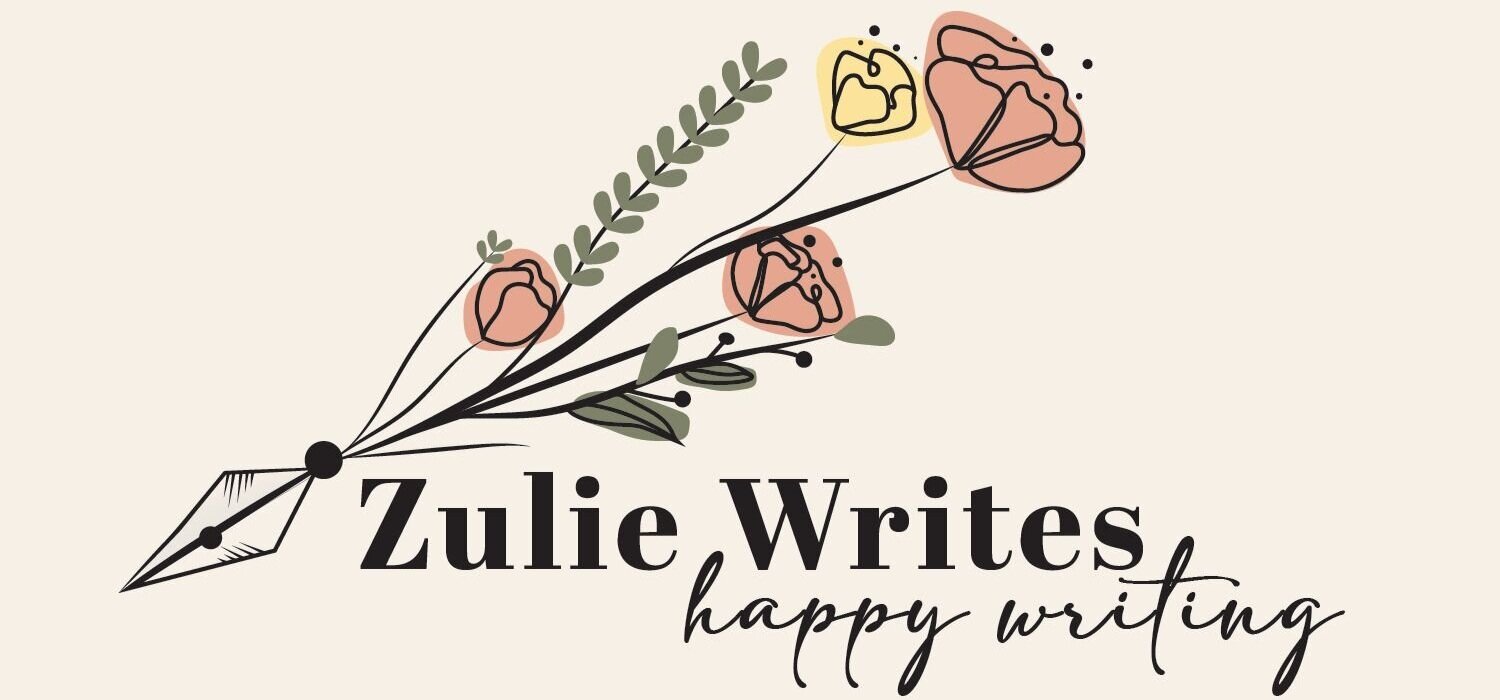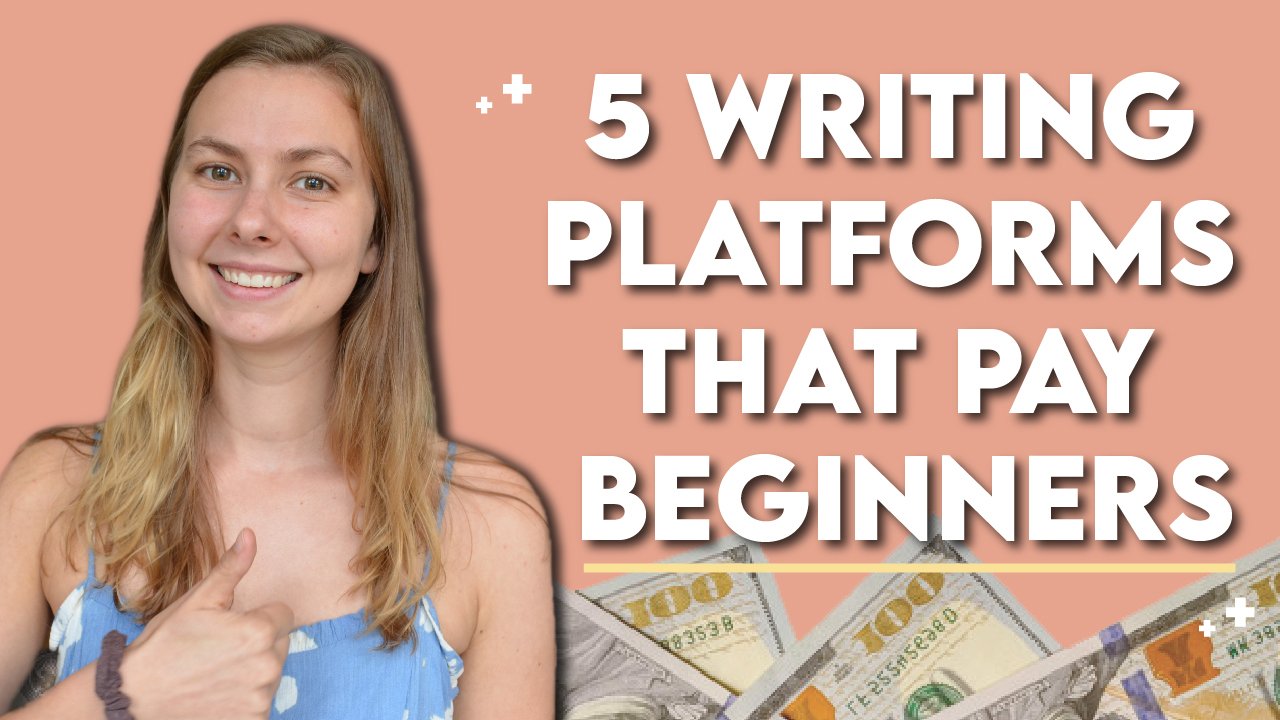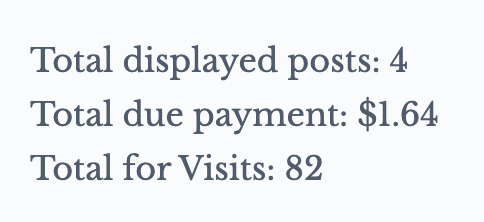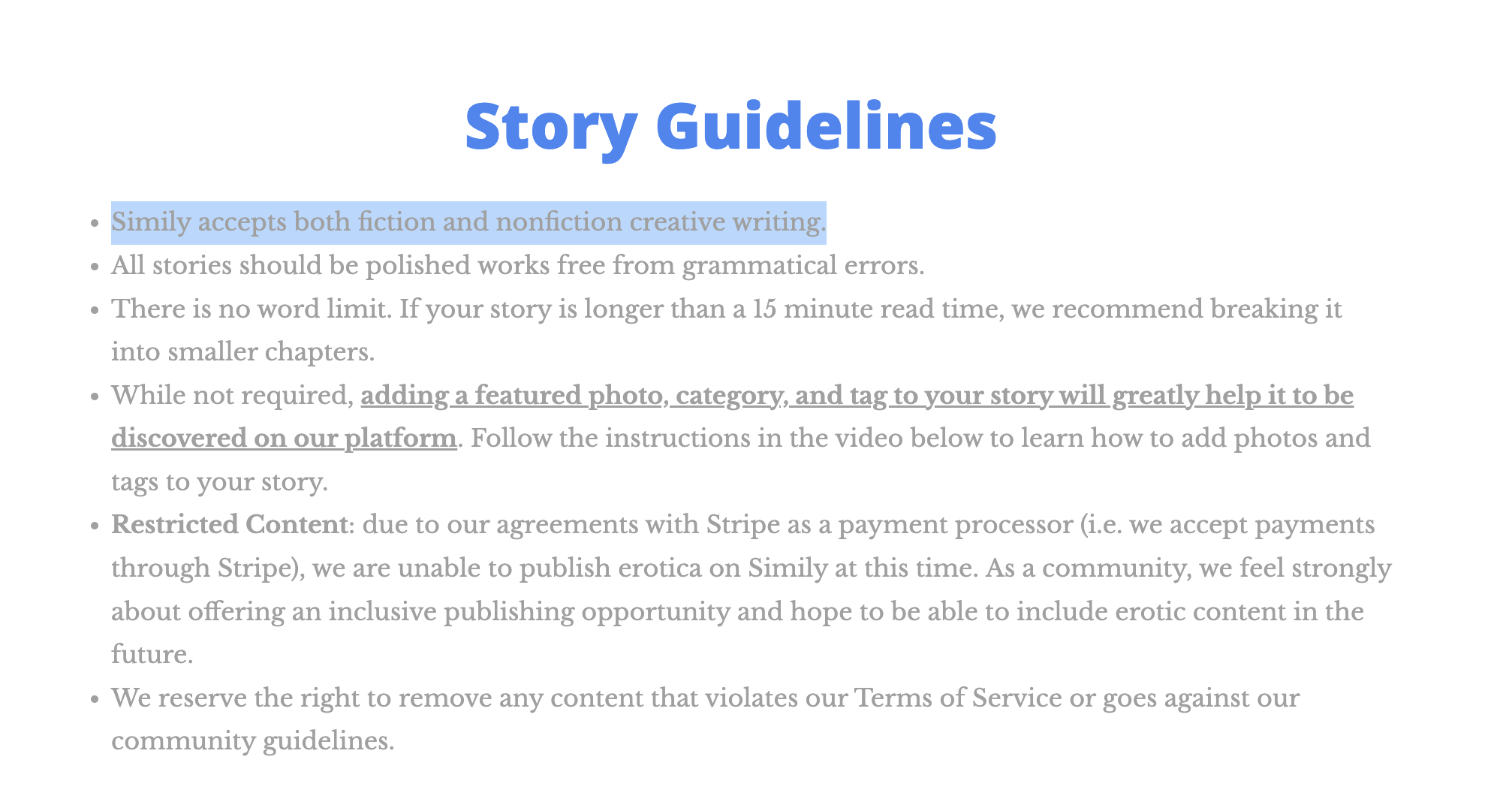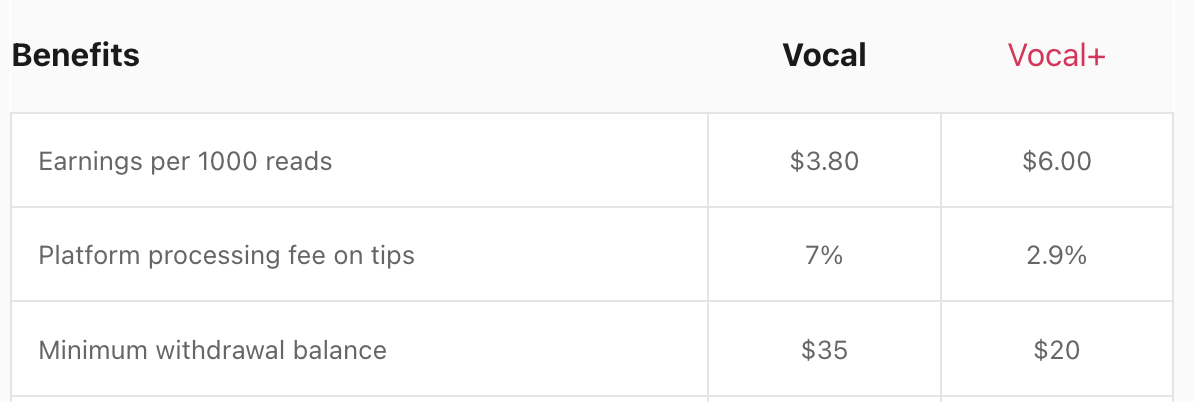5 Writing Platforms That Pay Beginners to Write
I’m writing this article about five writing platforms that pay beginners because I had no idea where to start when I started writing.
Back five years ago, I knew I wanted to make money writing, but the only way I knew how was vaguely through a personal blog and AdSense.
AdSense is complicated. I wish I had known then everything I know about how to join writing platforms that pay, even to those without experience.
Since I haven’t yet mastered time travel, I’ll do the next best thing and share my experiences with other people in my position. In this blog post, I’ll share five writing platforms that pay, and on which I have actually earned money.
Those are Simily, Vocal, Medium, Scripted, and Textbroker. Medium, Simily, and Vocal are reader-funded platforms, while Scripted and Textbroker are job boards.
Here’s the video if you prefer watching:
Medium
Simily
Vocal
Scripted
Textbroker
1. Medium
Medium is my favorite of the five writing platforms that pay because it gives you the most freedom.
It’s a blogging platform mixed with a social media platform. There are two sides to Medium: the reader's side and the writer's side.
As a reader, you can read two free articles per month. If you want unlimited access to articles, you have to pay $5/month to be a Medium member.
As a writer, every time one of your articles gets read by a paying Medium member, you earn a small portion of their membership fee. The more reads you get, the more money.
For reference, you get paid around $20 per 1,000 views, which is high!
The pros:
You can write about whatever you want – poetry, fiction, cats.
It’s easy to get started.
Even with 0 followers, you can get reads and views using mechanisms like publications and tags, which I explain in these videos.
Not sure where to get started? I recommend downloading my MEdium Starter Kit here. It’s free, you get a downloadable PDF guide and a daily email course walking you through your first week of Medium.
The cons:
You need 100 followers to get paid. (I think this is good actually – it may take a while to get there, but this weeds out the people who are only there to get rich quick.)
While you can write about anything, the typical topics tend to do best: health, wealth, and love. There are exceptions!
Medium pays you through Stripe. If you’re not in one of the countries that Stripe pays, you can’t get paid through the Medium Partner Program.
2. Simily
To date, I have earned a whopping $1.64, which is not even enough for a coffee refill in my local cafe. 😢
But it IS money I earned by posting fiction online, so 😄.
Simily has some real benefits. Here’s how it works.
You upload a story, you get paid $0.02 per view. And unlike almost every single other platform out there, it’s for creative writers. Fiction and nonfiction. You get 1000 views, you get $20 bucks.
Let’s talk about the benefits of this writing platform that pays first.
Pros:
For creative writing! If you write poetry, horror, nonfic creative writing, fantasy, or anything else in that realm, this platform is for you.
A predictable amount of money. It’s $0.02 per view.
Very, very easy to get started, with no bar. Write, publish, and earn.
Cons:
Have no clue how stories are recommended or discovered. Is there an algorithm? I’m not sure.
$10 minimum for payout, so you’ll need at least 500 views.
If you don’t like creative writing, this isn’t for you.
I don’t understand the business model yet. They say this $0.02 model is temporary until they get more readers.
I interpret this to mean that at some point, this writing platform will switch over to a royalty-based model. But for now, it has some other source of funding, so writers are earning money no matter who views their stories.
I applaud Simily for becoming a paid home for creative writers. They are few and far between.
3. Vocal
Vocal is similar to Simily, but with more organization. Plus, they also have Challenges, which I’ll get into below.
The way it works is, you upload a story. It gets approved (usually) or (rarely) not approved if it doesn’t meet specific guidelines (plagiarized, erotica, etc). Then you get paid per view.
Here’s the kicker: on Vocal, you only get paid $3.80 per 1000 views, or 0.0038 pennies per view. That’s less than a fifth of what you earn on Simily or Medium.
Now, if you upgrade to their paid Vocal+ program, you earn a higher rate — $6 per 1000 views. But because it costs $9.99 per month, you’d need to be getting thousands of views per month before it was financially worth it.
Vocal+ Challenges
They have another incentive for joining the Vocal+ program, though, and this is what makes Vocal unique: Challenges. They give you a prompt, you submit a story, and you have a chance to earn some real money if you’re a Vocal+ subscriber.
Currently, all the Challenges on the website are for Vocal+ only subscribers.
Prizes have been up to $20,000 in the past which is pretty wild.
Pros:
Super easy for beginners.
More creative-writing friendly than e.g. Medium.
Other options to earn money.
Get paid for non-member views, too, so if you know anything about SEO, that’s great.
Higher payout: you’ll need $35 to cash out, or $20 if you’re a Vocal+ member.
Cons:
Low pay rate compared to Simily and Medium.
Confusing rubric for getting views/winning the contest. Many people have said that the winners didn't follow the rubric or entered multiple times, or otherwise broke the rules.
Vocal+ feels a little weird to me.
A brief interlude
The three platforms above are all audience-focused platforms. That means you get paid when a reader views your story.
Now, we’re going to transition into client-focused writing platforms that pay. With these, you get paid when you complete a writing job that a client uploaded onto this site.
4. Scripted
This is a new one for me. It works like this:
You apply.
You fill out your portfolio.
You get writing jobs.
Let’s break down each of those steps.
To apply, you need to create an account and pass a test. The test is mostly focused on grammar and spelling.
I did consider showing the answers here, but ultimately I decided against it. Honestly, if you can’t pass it without help, you should probably spend a little time working on improving your grammar and writing skills before trying to get a writing job.
They say they only accept 5% of submissions, so take your time and don’t just breeze through it! I was also able to get some answers using Google as I took the test.
Once you’re in, you’ll be prompted to fill out your portfolio. Don’t skip this step! Do this properly, because this will impact the jobs you get offered.
If you don’t yet have a portfolio, I recommend posting a few blog posts on a website like Medium that can act as a free portfolio for you. Just two or three posts, written around industries you think you’d like to focus on.
After you fill out your portfolio, you’ll get three ways to earn money.
You’ll be sent SmartMatch Job invites. These are guaranteed work. The client sends out a work proposal, and based on your profile, Scripted will match it to writers. However, you have to act fast. Seriously, like within seconds of receiving the email. I tried to accept one two minutes after getting the invite and it was already gone!
Job invitations. This is a little less pressured. Clients send out job proposals and select a subgroup of writers to send them to, again based on your profile. They only look at the first five who draft a proposal. Within two to three weeks, they’ll let you know if you get accepted.
Regular writing jobs. Clients upload proposals onto Scripted, and you have the chance to draft writing proposals to send to them.
Let’s look at the pros and cons.
Pros:
Offer a minimum of 6.5c per word. That is HIGH for platforms like this!
Plenty of different work opportunities. I found jobs on aquaculture, sales and marketing, and lifestyle.
Set your rates. Scripted set a floor of 6.5c per word, but you can go higher.
Good clients. Many of these clients have worked with Scripted for 5–10 years, which seems like a good sign to me.
Cons:
It’s hard to get accepted.
The pace can be either too fast (Smartmatch requires an answer seemingly at lightspeed) or too slow (job invites can take two weeks to be accepted).
Requires upfront work before you’ll be accepted. You’ll have to create a proposal for some of these job opps.
You’ll need a few blog posts done already to use as a portfolio
5. Textbroker
Ah, Textbroker. This is not the first time I’ve reviewed Textbroker. In my last video, I kind of trashed it because of its complexity and low pay, which I stand by! However, in the meantime, I’ve received a lot of feedback from early writers who say that even earning $2.42 for an article is useful.
Look how janky this website is. The whole site is like this.
Textbroker acts like Scripted, except it’s more copywriting jobs and less blog-writing. The way it works is you apply, you get a star rating (one to five), and then you can accept jobs based on your star rating.
For context, I got a three-star rating when I applied. So that meant I was looking at jobs of around 1–3c per word.
You can get paid in three different ways:
Accepting jobs on the job board that is available immediately based on your star rating.
Applying to join Teams, where you freelance more regularly for a company through Textbroker. It typically is better paid with more work available, but it’s not a guaranteed income.
DirectOrders. Clients can specifically request to work with you based on your profile. (This hasn’t happened to me yet.)
You can see I’m still waiting on a rating I did a year ago. Also, how low I was paid for these jobs lol.
Pros:
No need to apply for a lot of jobs. You can just nab them and get paid.
Really good, short, entry-level jobs.
…I am genuinely struggling to think of a third pro.
Cons:
VERY low-paying jobs. Less than 5c a word even for good jobs
Kind of a confusing, grammar-heavy application. I mean, I’m a pretty good writer and I started with a 3-star rating. (Yes, I’m still salty.)
Wacky website, awful orders, long time for review. I’ve been waiting around a year to get reviewed for a job.
Seriously, the very best that can be said for this website is that it IS a writing platform that pays beginners… even if not very much, or for fun work. I guess it’s all money in the bank.
Which writing platform that pays is best?
Hopefully, these five options were a useful comparison of the various writing platforms that pay beginners.
If you want to get on a writing platform that pays beginners, I recommend a mix of places like Medium, where you’re writing for an audience, and places like Scripted, where you’ll have access to client-paid work. This makes sure you’ll always have something to write about, and you’ll always have an avenue to earn money by writing.
